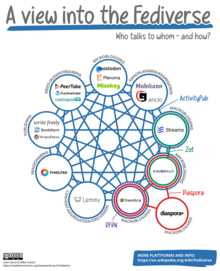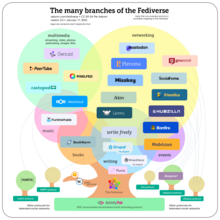The fediverse (a portmanteau of "federation" and "universe" [1]) is a collection of social networking servers which can communicate with each other, while remaining independently controlled from each other. Users on different social networks and websites can send and receive status updates, multimedia and other files to and from others across the network.

The majority of fediverse platforms that are available are free and open-source software, and are based on the ActivityPub protocol. However, alternative protocols such as AT Protocol and Nostr have formed their own networks separate from ActivityPub. [2]
Design
While a traditional social networking service will host all its content on servers managed by the owner of the website, the decentralized servers that make up the fediverse allow any individual or organization to host their own servers (referred to as an " instance").
Every instance is independent, and can set its own rules and expectations. Even so, much like how users of one email service such as Gmail can still send emails to users of another service such as Outlook, users may still view content and interact with users on any other instance in the fediverse. A user on one Mastodon instance, for example, may still view and interact with posts made by a user on a different Mastodon instance. [3]
Instances hosted by different social networking services may communicate with one another as well. A user on the microblogging platform Misskey, for example, may view and interact with posts made by users on Mastodon. Some fediverse networks even allow users to interact with different social networking formats from the same platform. For example, a user on a social news instance running Lemmy can interact with another post from a kbin instance, a similar service as well as microblog statuses from Mastodon. [4] [5]
History
Historical protocols

The concept and the functionality of the fediverse has existed before the ActivityPub protocol and the term itself. One of the first projects that included support for a decentralized social networking service was Laconica, a microblogging platform which implemented the OpenMicroBlogging protocol for communicating between different installations of the software. The software was later renamed to StatusNet in 2009, [6] before being merged into the GNU social project in 2013 along with Free Social, with the two latter servers being a fork of StatusNet. [7] [8]
Over time, the limitations of the OpenMicroBlogging protocol began to show, as it was designed as a one-way text messaging system. [9] To replace the aging protocol, OStatus was devised as an open standard for microblogging, combining various other technologies like Salmon, Atom, PubSubHubbub and ActivityStreams into a single protocol used for communicating between instances. StatusNet first implemented the protocol in March 3, 2010 with version 0.9.0, and quickly became the most popular federated protocol in usage.
Around the same time as OStatus was gaining popularity, the Diaspora social network was formed, using its own federated protocol. To illustarate the differences between the two protocols, the terms of the fediverse and the federation began to enter common usage, mainly after 2017. The term 'the fediverse' was used to describe the network formed by software using the OStatus protocol, such as GNU Social, Mastodon, and Friendica, in contrast to the competing Diaspora protocol under 'the federation'. [10]
ActivityPub
In December 2012, the flagship GNU social instance at the time, identi.ca, began to transition away from OStatus to a new protocol named Pump.io. The new protocol was designed to be useful for more than just status updates, and replaced Salmon, Atom and PubSubHubbub with JSON-LD and a REST API for its messaging and inbox systems, as well as making more use of ActivityStreams. While not as active and developed as its OStatus predecessor, it would end up becoming influential in the development of the ActivityPub standard.

In January 2018, the W3C presented the ActivityPub protocol as a recommended standard. [11] The standard aimed to improve the interoperability between different software packages running on a wide network of servers and to succeed both the OStatus protocol and Pump.io. [12] By 2019, almost all software that was previously using OStatus had removed the protocol in favor of ActivityPub (Friendica being a notable exception), [13] [14] and the term "fediverse" has since come to refer to the ActivityPub protocol and its supporting server software.[ citation needed]
Adoption
Following the acquisition of Twitter by Elon Musk in November 2022, certain major social networks, including Threads, [15] Tumblr and Flipboard have expressed interest in supporting the ActivityPub protocol. [16] Flickr had also expressed support in supporting ActivityPub, however no information was released by the company after the initial tweets by the CEO and is expected to be cancelled. [17] [18]
Automattic CEO Matt Mullenweg tweeted on November 22, 2022 that Tumblr was adding support for ActivityPub interoperability, in response to a user's complaints about Mastodon's complexity. [19] However, no further information was revealed for over a year, and was expected to be cancelled after a leaked reorganization that moved most of Tumblr's staff to other Automattic projects. However, in an AMA following the leak, he revealed that the interoperability feature was not cancelled and that there was a small team working on the potential of implementing the protocol. [20]
In December 2023, Flipboard announced that it has begun to federate selected profiles and magazines with the fediverse. It had previously ran its own Mastodon instance, flipboard.social, as a test of the Fediverse. [21]
The release of Threads in July 2023 had included in its press release that it planned to support interoperability with the ActivityPub protocol in the future. [22] [23] In December 2023, select Meta employees began to federate with ActivityPub. [24] A roadmap was revealed in January 2024 that detailed the integration of ActivityPub in Threads. [25]
In March 2024, Threads implemented a beta version of Fediverse support, allowing Threads users to view the number of Fediverse users that liked their post, and allowing Fediverse users to view posts from Threads on their own instances. [26] [27] [28] On April 2, the official Threads account for President Joe Biden enabled federation on its profile, making Biden the first President of the United States to have a presence on the fediverse. [29]
Software
-
ActivityPub, a
W3C standard, is the most widely used protocol in the fediverse. Some popular fediverse software includes:
[30]
-
Microblogging
- Mastodon, a microblogging social network written in Ruby [31]
- Misskey, a popular Japanese social network written in TypeScript [32]
- Pleroma, a lightweight microblogging server written in Elixir [33]
- Social news
-
Macroblogging
- Friendica Alternative to Facebook, written in PHP
- Content management system
- PeerTube, a video streaming service similar to YouTube
- Pixelfed, an Instagram alternative
- Matrix (via bridges [36])
-
Microblogging
- AT Protocol
See also
References
- ^ "Definition of fediverse". PCMAG. Retrieved April 3, 2024.
- ^ "Bluesky: An Open Social Web". Bluesky. Retrieved April 3, 2024.
- ^ Woloshyn, Roxannna (July 19, 2023). "What is the fediverse and why does Threads want to join?". CBC. Archived from the original on July 24, 2023. Retrieved July 24, 2023.
- ^ "Home | kbin.pub – Fediverse of content". /kbin. Archived from the original on July 25, 2023. Retrieved July 24, 2023.
- ^ "Mbin - a fork of kbin - community-focused". fedidb.org/software/mbin. Archived from the original on February 28, 2024. Retrieved February 28, 2024.
- ^ "Laconica is now StatusNet « StatusNet – Open Source microblogging service". August 31, 2009. Archived from the original on August 31, 2009. Retrieved April 4, 2024.
- ^ "GNU social". June 8, 2013. Archived from the original on August 22, 2013. Retrieved April 4, 2024.
- ^ "StatusNet, Identi.ca, and transitioning to pump.io [LWN.net]". lwn.net. Retrieved April 4, 2024.
-
^
"Understanding OStatus | StatusNet". December 26, 2011. Archived from the original on December 26, 2011. Retrieved April 4, 2024.
{{ cite web}}: CS1 maint: bot: original URL status unknown ( link) - ^ Tilley, Sean (September 24, 2017). "A quick guide to The Free Network". We Distribute. Archived from the original on November 8, 2020. Retrieved July 25, 2023.
- ^ "Victory for libre networks: ActivityPub is now a W3C recommended standard — Free Software Foundation — Working together for free software". www.fsf.org. Retrieved April 4, 2024.
- ^ "Pleroma Encyclical: ActivityPub". Lainblog. February 10, 2018. Retrieved April 3, 2024.
- ^ "Remove OStatus-related code · Issue #10740 · mastodon/mastodon". GitHub. Archived from the original on July 25, 2023. Retrieved July 25, 2023.
- ^ "Mastodon 3.0". October 11, 2019. Retrieved April 3, 2024.
-
^
"Introducing Threads: A New Way to Share with Text". July 5, 2023. Retrieved December 25, 2023.
Our vision is that people using compatible apps will be able to follow and interact with people on Threads without having a Threads account, and vice versa, ushering in a new era of diverse and interconnected networks.
- ^ Bell, Karissa (July 5, 2023). "Meta's Threads app is here to challenge Twitter". Engadget. Yahoo. Archived from the original on July 6, 2023. Retrieved July 6, 2023.
- ^ Davenport, Corbin (November 25, 2022). "Tumblr and Flickr Might Join Mastodon's "Fediverse" Network". How-To Geek. Retrieved April 3, 2024.
- ^ "Flickr: The Help Forum: ActivityPub/Mastodon support status". www.flickr.com. Retrieved April 3, 2024.
- ^ Perez, Sarah (November 21, 2022). "Tumblr to add support for ActivityPub, the social protocol powering Mastodon and other apps". TechCrunch. Retrieved April 3, 2024.
- ^ Perez, Sarah (December 11, 2023). "Tumblr's 'fediverse' integration is still being worked on, says owner and Automattic CEO Matt Mullenweg". TechCrunch. Retrieved April 3, 2024.
- ^ McCue, Mike (December 19, 2023). "Flipboard Begins to Federate". Medium. Retrieved April 2, 2024.
- ^ "Introducing Threads: A New Way to Share With Text". Meta. July 5, 2023. Retrieved April 3, 2024.
- ^ Mehta, Ivan (July 5, 2023). "Adam Mosseri says Meta's Threads app won't have ActivityPub support at launch". TechCrunch. Retrieved April 3, 2024.
- ^ Davis, Wes (December 13, 2023). "Threads is officially starting to test ActivityPub integration". The Verge. Retrieved April 3, 2024.
- ^ "How Threads will integrate with the Fediverse – plasticbag.org". January 12, 2024. Retrieved April 3, 2024.
- ^ Mark, Zuckerberg (March 21, 2024). "Threads". www.threads.net. Retrieved March 21, 2024.
- ^ Roth, Emma (March 21, 2024). "Threads' fediverse beta opens to share your posts on Mastodon, too". The Verge. Retrieved March 22, 2024.
- ^ Forristal, Lauren (March 21, 2024). "Threads opens beta to let users connect their accounts to the fediverse". TechCrunch. Retrieved April 3, 2024.
- ^ Davis, Wes (April 2, 2024). "President Biden is now posting into the fediverse". The Verge. Retrieved April 3, 2024.
- ^ "FediDB".
- ^ mastodon/mastodon, Mastodon, April 3, 2024, retrieved April 3, 2024
- ^ "Misskey Hub – Official website of the Misskey Project". Misskey Hub. Retrieved April 3, 2024.
- ^ "Pleroma — a lightweight fediverse server". pleroma.social. Retrieved April 3, 2024.
- ^ Pfefferle, Matthias. "ActivityPub". WordPress.org. Archived from the original on July 2, 2022. Retrieved November 28, 2022.
- ^ "ActivityPub". Drupal.org. February 23, 2019. Archived from the original on March 6, 2022. Retrieved March 6, 2022.
- ^ "Kazarma". kazar.ma. Archived from the original on July 27, 2023. Retrieved July 27, 2023.
- ^ Pierce, David (December 19, 2023). "2023 in social media: the case for the fediverse". The Verge. Retrieved January 11, 2024.
Further reading
- 2022. Toxicity in the Decentralized Web and the Potential for Model Sharing
- 2021. Exploring Content Moderation in the Decentralised Web: The Pleroma Case
- 2019.
The disinformation landscape and the lockdown of social platforms

- 2019. Challenges in the Decentralised Web: The Mastodon Case
- 2018. Recommending Users: Whom to Follow on Federated Social Networks
- 2018. Multi-task dialog act and sentiment recognition on Mastodon
- 2015.
FCJ-190 Building a Better Twitter: A Study of the Twitter Alternatives GNU social, Quitter, rstat.us, and Twister

- 2015.
The Case for Alternative Social Media
